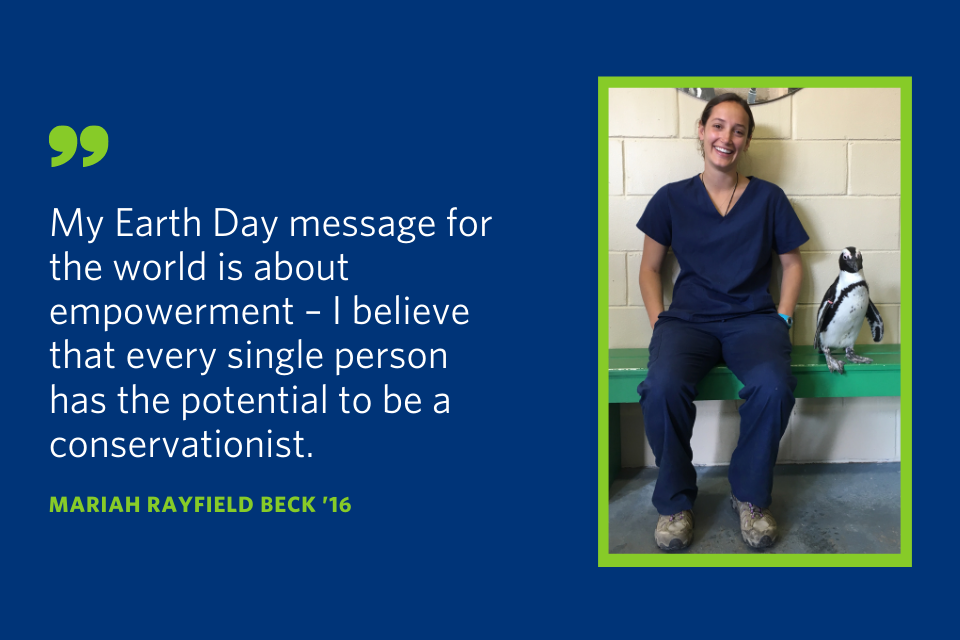Brandeis Alumni, Family and Friends
Mariah Rayfield Beck ’16 Reflects on Earth Day

Mariah Rayfield Beck ’16 is graduating from Cornell University College of Veterinary Medicine next month and soon will begin a small animal internship in Rhode Island. She plans to specialize in wildlife and conservation medicine.
In honor of Earth Day, which marks its 50th anniversary on April 22, the Brandeis Alumni Association invited her to reflect on the connection between wildlife health and human disease, also the topic of her recent article on Medium.
Humans, non-human animals and environmental health are infinitely interconnected. Healthy animals are essential for stable ecosystems and humans rely on stable and healthy ecosystems to survive. Governments, industries and people are currently making choices that degrade the wellbeing of humans, non-human animals and the environment. Human issues -- such as social inequality, disease, crime, poverty, food insecurity and access to water -- are degrading forces for human communities. The production of greenhouse gases and progression of climate change worsen those problems. Increasingly difficult lives for human beings often lead to exploitation of wildlife and the environment, which then further destabilizes human communities in a vicious cycle. Together, problems in any of the realms of planetary health feed off of one another in a cycle, cumulatively leading to more and more destabilization and suffering for wildlife, human beings, and the planet.
It is very important to look at these connections with a lens of social justice, something that Brandeis strives to bring to the forefront. Some of the wealthiest countries are making choices and continuing activities that severely damage the health of wildlife and the environment. Those activities make the world an increasingly inhospitable place for many species, including humans. Unfortunately, many underprivileged communities and developing nations often bear the brunt of the consequences of those activities.
The COVID-19 pandemic has forced us to dramatically change our daily activities and that has shown some benefits and drawbacks for planetary health. Things I normally do to reduce my waste, such as zero-plastic shopping and food waste composting, are no longer possible during the pandemic: bulk food sections are closed, compost drop-offs are temporarily suspended and we are no longer able to use our own containers. I suspect that our landfill waste production has significantly increased during this time, which is unfortunate given how much waste we already produce. On the other hand, many areas of the world are seeing the best air quality that they have witnessed in decades. A preliminary study has connected increased air pollution with a higher mortality rate from COVID-19. I hope that seeing how fast our daily actions can change pollution and how our health directly benefits as a result will help motivate and empower people to reconsider their daily behaviors.
This global crisis has also exposed many deeply rooted problems in the way we structure our societies and live our lives. This pandemic is one in a long line of devastating emerging diseases -- HIV, Ebola, SARS -- that have been rooted in our abuse and exploitation of wild animals. I think it has revealed this relationship to many people that didn’t feel connected to wildlife health before and it has taught us the repercussions of continuing these behaviors. In addition to our connection to wildlife health, this global crisis has exposed the tragic consequences of deep and extensive inequality in our society.
We have a unique opportunity to reflect on how we are living on this planet and how we might want to change our behaviors and values moving forward. The next step after reflecting is to stand up, take action and demand change. This pandemic is a very dark time for many people around the world. Hopefully we can take the opportunity to see how we are connected, look at the injustices of the world and commit to doing something about them.
My Earth Day message for the world is about empowerment: I believe that every single person has the potential to be a conservationist. Every individual has an entirely unique perspective and set of skills to offer the world. Apply your personal toolbox to whatever issues you feel most passionate about. Any positive impact you make on one issue will inevitably affect other important aspects of planetary health. Earth Day is about the interconnected nature of this planet. If we hope to continue successfully inhabiting the Earth, I believe we are going to have to connect with each other and truly collaborate to solve the most important issues facing us right now.
My Brandeis experience provided me with several important tools for making the positive impact that I hope to make on the world. In addition to being a veterinarian, I am also an educator. My passion for education was really fostered at Brandeis. I had the opportunity to tutor local children and I was a supplemental instructor for general chemistry. I am really grateful for those experiences and how they shaped my development as an educator. Education is an important key to so many problems.
Read additional Earth Day reflections from Brandeis alumni.
Published On: April 20, 2020






